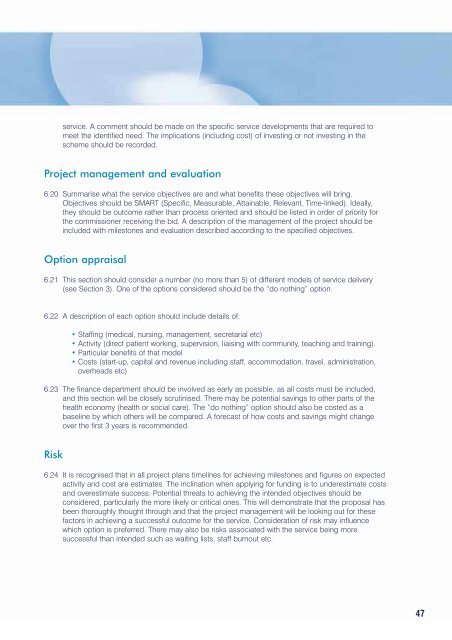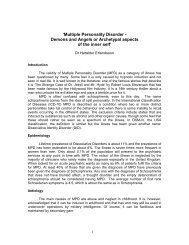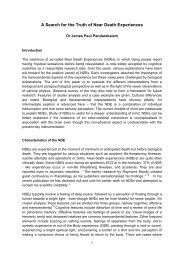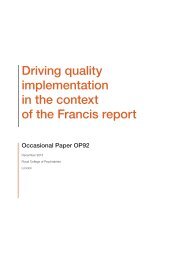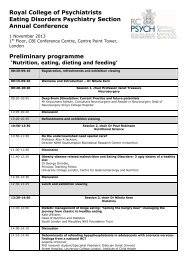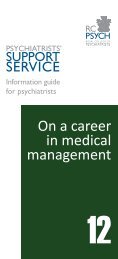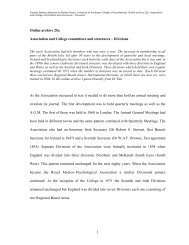Who Cares Wins - Royal College of Psychiatrists
Who Cares Wins - Royal College of Psychiatrists
Who Cares Wins - Royal College of Psychiatrists
You also want an ePaper? Increase the reach of your titles
YUMPU automatically turns print PDFs into web optimized ePapers that Google loves.
service. A comment should be made on the specific service developments that are required to<br />
meet the identified need. The implications (including cost) <strong>of</strong> investing or not investing in the<br />
scheme should be recorded.<br />
Project management and evaluation<br />
6.20 Summarise what the service objectives are and what benefits these objectives will bring.<br />
Objectives should be SMART (Specific, Measurable, Attainable, Relevant, Time-linked). Ideally,<br />
they should be outcome rather than process oriented and should be listed in order <strong>of</strong> priority for<br />
the commissioner receiving the bid. A description <strong>of</strong> the management <strong>of</strong> the project should be<br />
included with milestones and evaluation described according to the specified objectives.<br />
Option appraisal<br />
6.21 This section should consider a number (no more than 5) <strong>of</strong> different models <strong>of</strong> service delivery<br />
(see Section 3). One <strong>of</strong> the options considered should be the “do nothing” option.<br />
6.22 A description <strong>of</strong> each option should include details <strong>of</strong>:<br />
• Staffing (medical, nursing, management, secretarial etc)<br />
• Activity (direct patient working, supervision, liaising with community, teaching and training).<br />
• Particular benefits <strong>of</strong> that model<br />
• Costs (start-up, capital and revenue including staff, accommodation, travel, administration,<br />
overheads etc)<br />
6.23 The finance department should be involved as early as possible, as all costs must be included,<br />
and this section will be closely scrutinised. There may be potential savings to other parts <strong>of</strong> the<br />
health economy (health or social care). The “do nothing” option should also be costed as a<br />
baseline by which others will be compared. A forecast <strong>of</strong> how costs and savings might change<br />
over the first 3 years is recommended.<br />
Risk<br />
6.24 It is recognised that in all project plans timelines for achieving milestones and figures on expected<br />
activity and cost are estimates. The inclination when applying for funding is to underestimate costs<br />
and overestimate success. Potential threats to achieving the intended objectives should be<br />
considered, particularly the more likely or critical ones. This will demonstrate that the proposal has<br />
been thoroughly thought through and that the project management will be looking out for these<br />
factors in achieving a successful outcome for the service. Consideration <strong>of</strong> risk may influence<br />
which option is preferred. There may also be risks associated with the service being more<br />
successful than intended such as waiting lists, staff burnout etc.<br />
47


